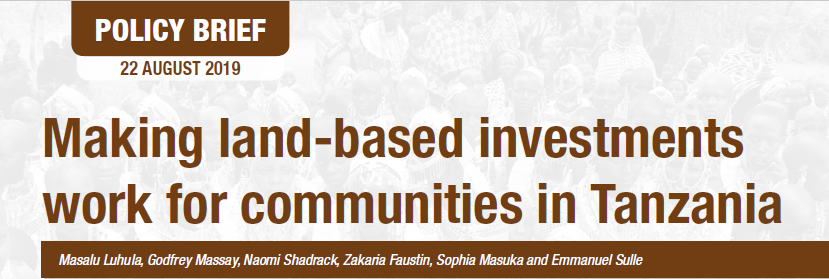Pastoralism, Policy Analysis and Advocacy – A Training

From October 22 - 26, TNRF held a training in Mwanza on Pastoralism, Policy Analysis and Advocacy. The training was part of a TNRF and CARE project known as the "Pastoralist Program", which seeks to reduce poverty and vulnerability of pastoralist communities in Tanzania, with the purpose of advancing pastoralist men, women and children's right to a sustainable livelihood. The training in Mwanza brought together CSO representatives, Local Government Authority and district leaders from districts in the Lake and Central zones.
Read more about the training here.
The objectives of the training were to:
- Enable participants from implementing CSOs, LGAs and local leaders to define and internalize concepts of pastoralism for better management of resources for improved livelihood
- Equip participants with knowledge and skills on pastoral systems, policy analysis and advocacy.
- To familiarize participants with approaches and steps to follow when engaging with policy analysis and advocacting at the local level.
- To enable the organizations participating in the training to better practice and integrate pastoral systems into natural resource management initiatives in their respective localities for betterment of pastoral livelihoods.
After the five days of training, participants identified the following actions that will lead to improved pastoralist rights and livelihooods in their regions and in Tanzania more generally.
- The benefits of working together:
- LGAs, local leaders and CSOs should raise awareness about the benefits that networks and collaborations can bring in fighting for improved and strengthened rights for pastoralists.
- CSOs should join efforts in raising awareness in pastoral communities about pastoralism, and to disseminate skills and knowledge about advocacy, policies, etc. countrywide.
- CSOs identified the need to revitalize Pastoral networks in the lake zone that have been dormant for a few years. They feel this will help address pastoralists needs in the region
- LGAs and local leaders agreed to join efforts and advocate for the implementation of policies that will protect pastoralists at the local level (e.g. right of livestock corridors and protection of communal grazing land under Grazing Land Act and Village land Act, and bylaws). This advocacy work can begin at the next full council meeting.
- Improve knowledge about pastoralist systems and dynamics
- There is a knowledge gap for decision makers as they have few linkages to pastoral issues or to the challenges and needs at district level; therefore, there is a need to provide trainings on pastoral systems and the dynamics of pastoralism for decision makers.
- Participants commented that pastoralism should be included in the curriculum of formal education systems in livestock training colleges and universities.
- In Tanzania, individuals, CSOs and decision makers have little to no access to useful research and information on pastoralism that can support their advocacy strategies. Extra effort is needed to protect pastoralists' rights in communal livestock keeping system; pastoralists need to network with other actors to advocate for their rights and have access to research findings for evidence.
- Training and awareness on pastoralism should be expanded and disseminated through multiple communications channels, including the internet, TV, radio and news papers.
- Pastoralism needs stronger and more supportive policies
- There is a need to advocate for policy review to protect pastoralists grazing lands and rights on mobility, especially amongst councilors and LGAs. This should start at the district level at full council meetings.
- Pastoralists are facing many problems along the chain of traditional grazing system, including due to policy constraints. During Policy formulation processes, technical staff, including LGAs usually consult and participate in drafting the policy. LGAs were requested by local leaders to work professionally and with high integrity during policy making processes to protect pastoral rights and needs about land and their traditional system of mobility.
- Pastoralism needs stand alone policies in Tanzania. Pastoralism should be protected and advocated for through joint efforts and networking.
- Pastoralist groups should be included in the policy making/review processes.
- There is a need to advocate for a review of the livestock policy to recognize pastoralism as livelihoods system that is systematic, environmentally friendly and sustainable.
- In areas surrounded by national parks, WMAs, hunting blocks and protected areas, livestock should be given priority on accessing grazing land in village land rather than the currentl practice of giving priority to wildlife.
- To protect pastoralist rights, pastoralism should be integrated into all levels of decision making (village, ward, district and national).
At the end of the workshop, participants left with increased knowledge and skills to better advocate for improved policies that will support pastoralist systems. Overall, it was agreed that this kind of training should be scaled-up and expanded so that awareness about these issues can be mainstreamed.

